Table of Contents
ToggleAre you concerned about excessive hair fall? Losing hair can be distressing, but understanding the reasons behind it can help you find effective solutions. In this article, we delve into the various factors contributing to hair loss and provide practical tips to address the issue.
Why Am I Losing So Much Hair? Common Factors Explored
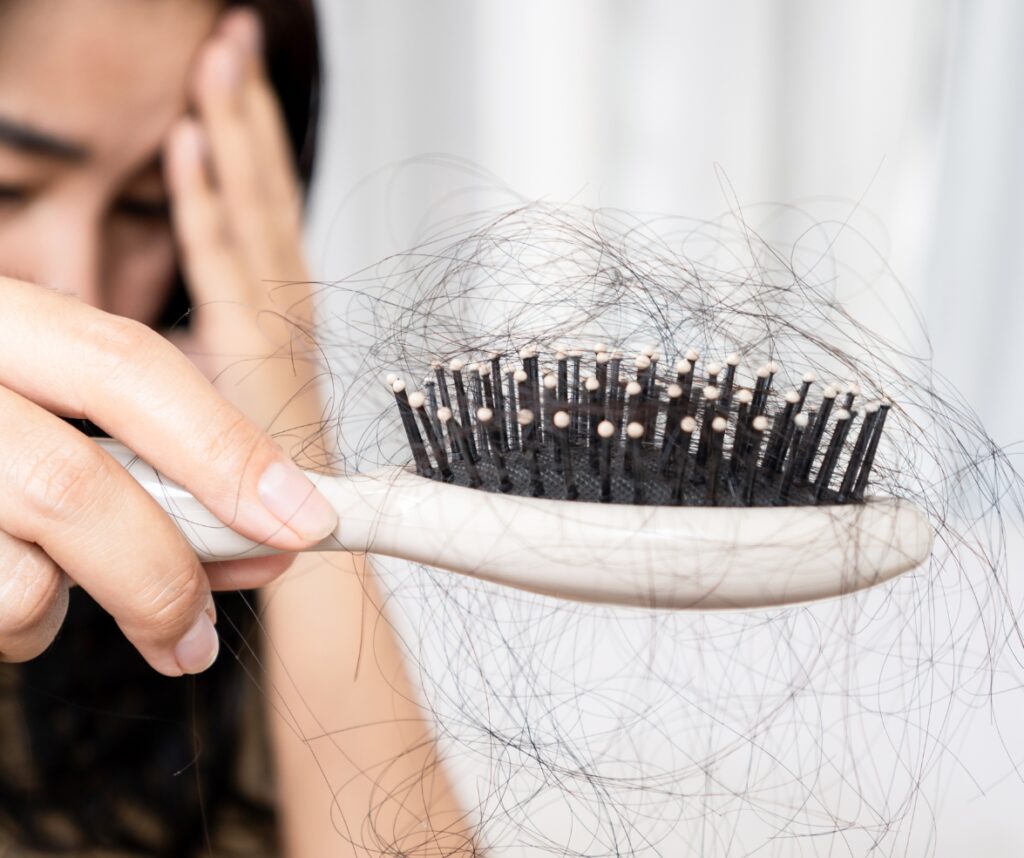
What is difference between hair loss and hair fall?
Hairfall and hair loss is not a same thing. Hair loss is sudden lost of hairs probably in patches on the head. Where as hair fall is lost of hairs that is hair thinning over a period of time follows baldness patterns in male or female.
Hair loss or hair fall reasons:
Hair loss can occur due to multiple reasons, including genetics, hormonal changes, stress, and certain medical conditions. Understanding these factors can help determine the appropriate course of action to prevent further hair loss and promote regrowth.
Hairfall, or losing hair, can be caused by multiple factors. Genetics plays a significant role, as certain individuals are more prone to hair loss due to inherited traits. Hormonal changes, such as those during puberty, pregnancy, and menopause, can also contribute to hairfall. Additionally, high levels of stress can trigger hair loss by disrupting the normal hair growth cycle. Certain medical conditions, like alopecia areata or thyroid disorders, can further exacerbate hairfall.
Understanding these factors is crucial in determining the appropriate course of action. By identifying the underlying cause, individuals can take targeted measures to prevent further hair loss and promote regrowth. Consulting with healthcare professionals or trichologists can provide personalized guidance and treatment options tailored to the specific condition. Remember, addressing the root causes of hairfall is key to achieving the best possible outcomes.
Why Am I Losing So Much Hair in the Shower? Unveiling the Truth

Finding an excessive amount of hair in the shower drain can be concerning. We discuss how hair shedding works and explain why it may seem like you’re losing more hair while shampooing. Additionally, we offer tips to minimize hair loss during showering.
Understanding how hair shedding works is crucial in addressing hairfall concerns. During the hair growth cycle, older hairs naturally reach the end and fall out to make room for new growth, a process called hair shedding. While shampooing, it may seem like you’re losing more hair due to the removal of loose hairs already in the shedding phase.
To minimize hair loss during showering, follow these tips: Use a gentle shampoo suitable for your hair type to avoid harsh chemicals that can cause damage. Do not us e hard water such as bore well water. Opt for lukewarm water instead of hot water to prevent stripping the hair of its natural oils and weakening the follicles.Use pure oil for head massage at least once or twice a weak. Be mindful of vigorous scrubbing and harsh brushes, as they can lead to breakage. Instead, use a wide-toothed comb or your fingers to gently detangle your hair. Consider incorporating a nourishing conditioner to provide moisture and enhance overall hair health.
By implementing these practices, you can effectively reduce hair loss during showering and promote a healthier scalp and hair growth. Remember, a certain amount of hair shedding is normal, but if you notice excessive or prolonged hair loss, it’s advisable to seek professional advice from a healthcare provider or a trichologist for further evaluation and guidance.
Hair Loss in Men and Women: Reasons and Solutions
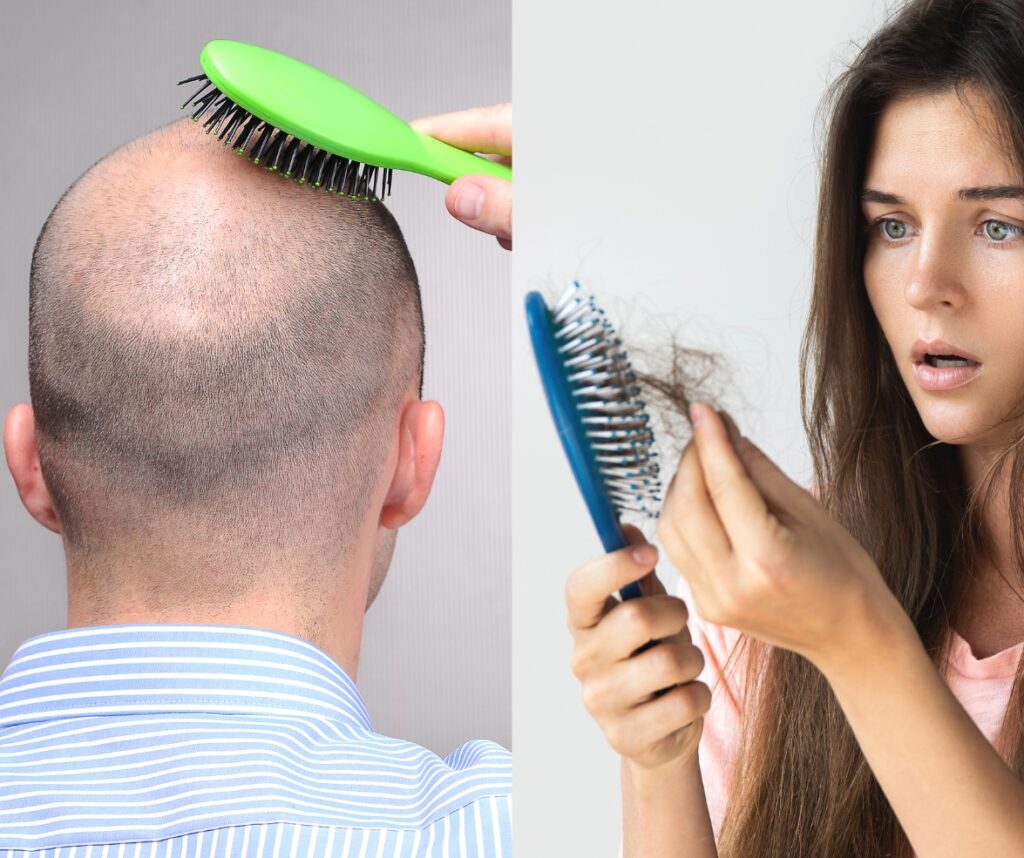
Both males and females experience hair loss, but the underlying causes can differ. We explore the common triggers and effective treatments for hair loss in men and women, shedding light on the importance of early intervention for optimal results.
Hair loss, or hairfall, can affect both men and women, and understanding the common triggers is essential. In men, androgenetic alopecia, or male pattern baldness, is a primary cause. Women may experience hair loss due to hormonal changes, like postpartum shedding or menopause. Early intervention is crucial for optimal results.
Effective treatments for hair loss in men include medications like minoxidil and finasteride. Hair transplant surgery can also restore lost hair. Hair loss treatment for women, mainly by addressing hormonal imbalances and nutrient deficiencies. Topical treatments, such as minoxidil, stimulate hair growth. Adopting a healthy lifestyle is beneficial for hair health. Seeking professional advice is crucial. Early intervention prevents further hair loss and yields the best outcomes.
hair loss stages in male and female :
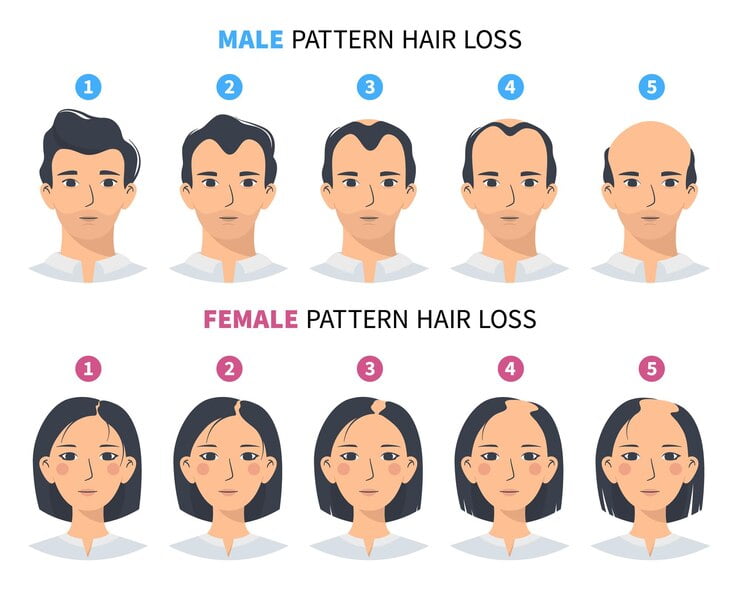
Hair Loss as a Teenager: Understanding the Adolescent Phase
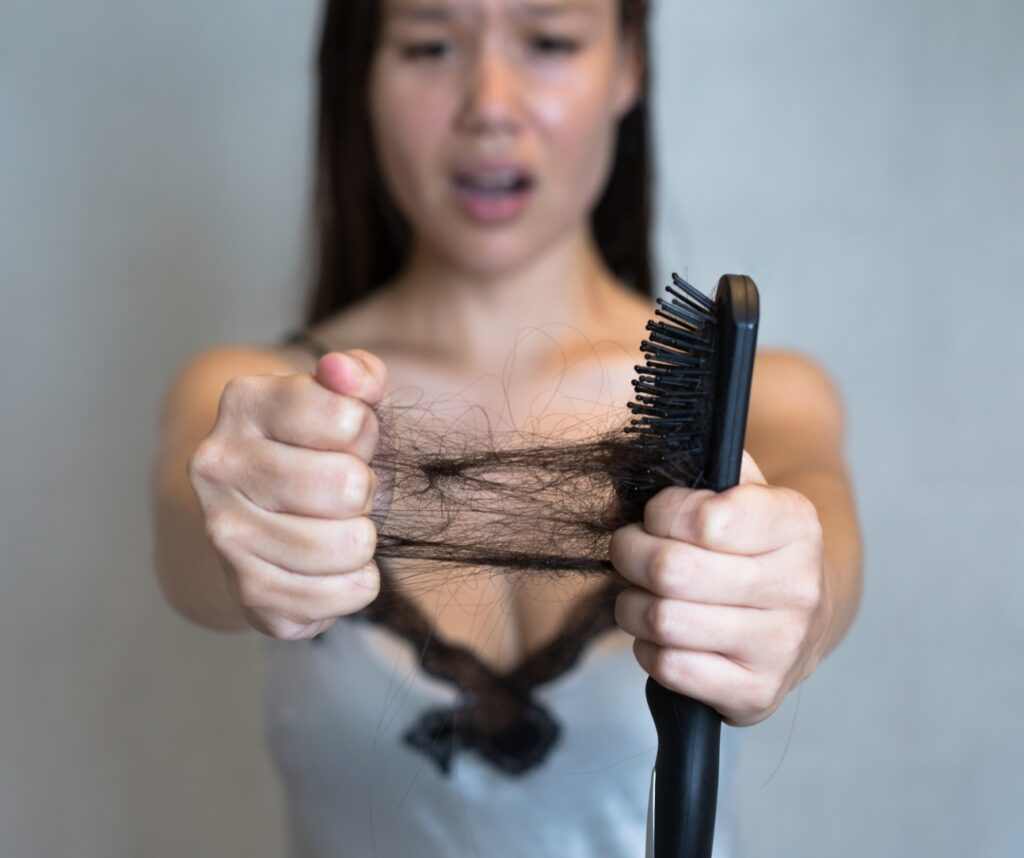
Teenagers may encounter hair loss due to various factors, such as hormonal changes, nutritional deficiencies, and styling habits. We discuss the specific reasons behind hair loss in teenagers and suggest ways to promote healthy hair growth during this transitional period.
Hairfall can be a concern for teenagers, probably at 15 to 20 age in male and female and understanding the specific reasons behind it is important. Hormonal changes during puberty can lead to increased hair shedding. Additionally, certain hair practices like excessive heat styling or tight hairstyles can contribute to hair loss. It is crucial for teenagers to adopt healthy hair care habits to promote optimal hair growth during this transitional period.
To promote healthy hair growth, teenagers should focus on nourishing their hair from within by maintaining a balanced diet rich in vitamins and minerals. They should avoid harsh chemical treatments and excessive heat styling that can damage the hair. Regularly washing the hair with a gentle shampoo and conditioner and avoiding tight hairstyles can help reduce hair breakage. It is also essential to protect the hair from environmental damage by wearing a hat or using UV protection products when exposed to the sun.
By understanding the reasons behind hair loss in teenagers and adopting healthy hair care practices, they can maintain strong and healthy hair during this important phase of their lives. Remember, seeking doctors advice from dermatologists or trichologists can provide personalized guidance and ensure optimal hair care routines.
Post-COVID Hair Loss: Unraveling the Connection
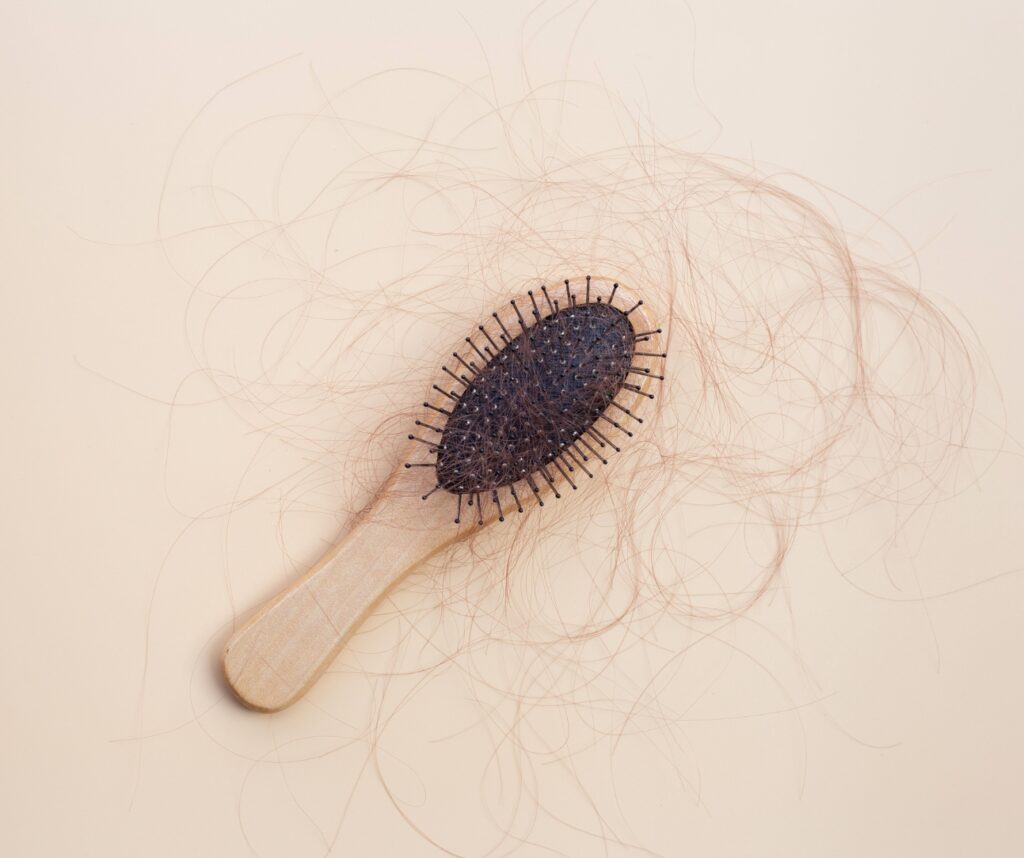
COVID-19 recovery can sometimes lead to temporary hair loss. We delve into the link between the virus and hair fall, providing insights into the causes and duration of post-COVID hair loss. It is also same for post dengue and typhoid treatment. Learn how to manage this condition effectively.
The link between the virus and hairfall, particularly post-COVID hair loss, is worth exploring. Hair loss after recovering from COVID-19 is a common occurrence, known as telogen effluvium. This condition is triggered by the physiological stress caused by the infection, resulting in a disruption of the hair growth cycle.
Post-COVID hair loss usually occurs around 2-3 months after recovery and can last for several months. It’s important to note that the hair loss is temporary and the hair usually regrows naturally. Managing this condition effectively involves adopting a healthy lifestyle, including a balanced diet and stress management. Nourishing the body with adequate nutrients, such as vitamins and minerals, can support hair growth. Gentle hair care practices, like avoiding excessive heat styling and tight hairstyles, can also help minimize hair breakage. Patience and self-care are key during this period, as the hair gradually returns to its normal growth cycle.
While post-COVID hair loss can be distressing, it is usually a temporary condition. If you experience persistent or severe hair loss, it’s advisable to consult a healthcare professional or a dermatologist for proper evaluation and guidance. Remember, taking care of your overall health and well-being is crucial for promoting hair regrowth and restoring hair density.
Hair Loss During Pregnancy and Postpartum: Navigating the Changes
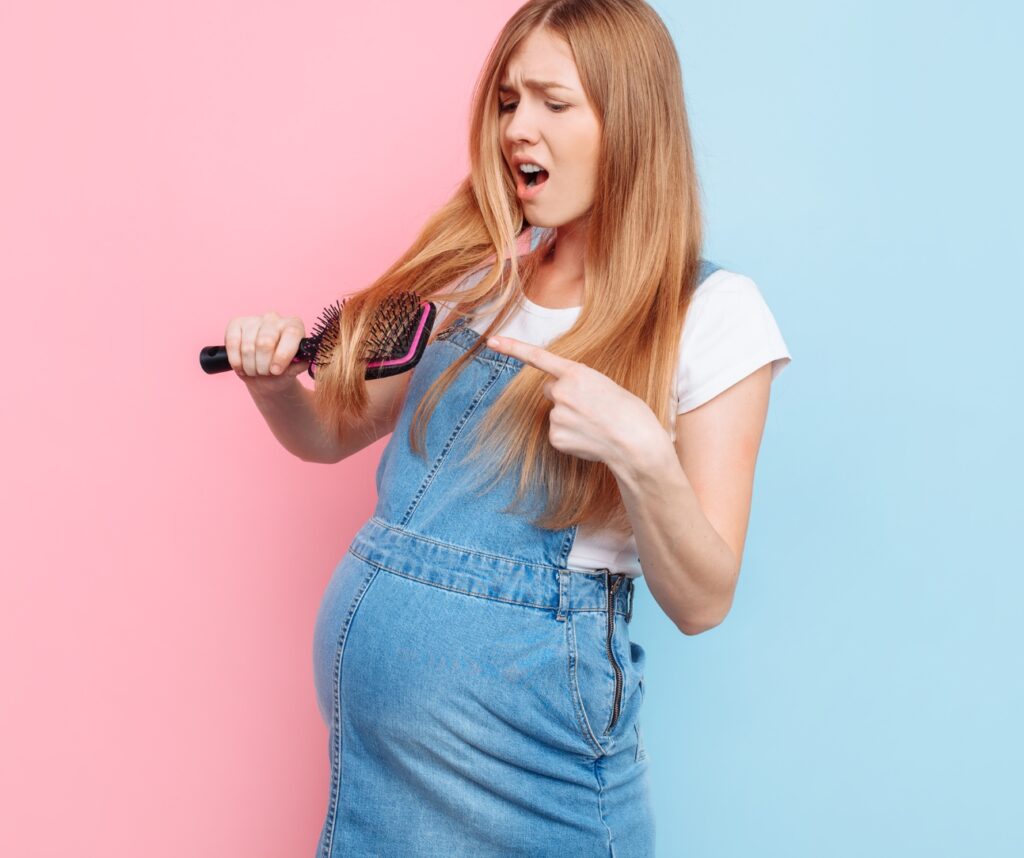
Pregnancy and childbirth can bring about significant changes in a woman’s body, including hair loss. We explain the hormonal and physiological factors contributing to hair fall during and after pregnancy, as well as ways to address the issue.
Hairfall during and after pregnancy can be attributed to hormonal and physiological factors. During pregnancy, hormonal changes cause a prolonged hair growth phase, resulting in thicker, fuller hair. However, after childbirth, hormone levels normalize, leading to hair shedding as the hair follicles enter a resting phase.
To address post-pregnancy that is after delivery hairfall, focus on maintaining a healthy lifestyle, including a balanced diet rich in nutrients like vitamins A, C, and E, and minerals such as iron and zinc. Gentle hair care practices, like using a wide-toothed comb and avoiding excessive heat styling, can minimize hair breakage. Additionally, managing stress levels through relaxation techniques can help support healthy hair growth.
How to Control Hair Loss: Strategies for Healthy Hair Growth at home
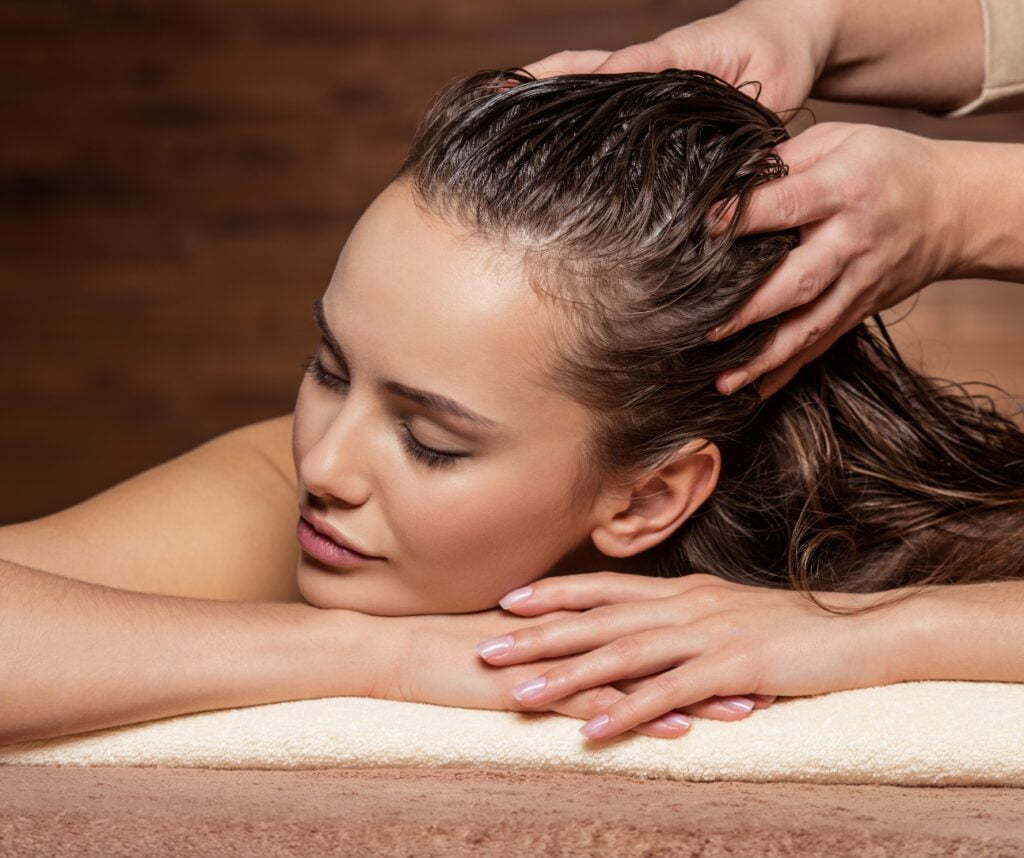
Hair loss or hair fall treatment or solutions:
Preventing hair loss requires a comprehensive approach. We provide expert advice on maintaining a balanced diet, managing stress levels, adopting a suitable hair care routine, and seeking professional assistance when necessary.
Maintaining a balanced diet is crucial for healthy hair. Include nutrient-rich foods like fruits, vegetables, lean proteins, and whole grains. Managing stress levels through activities like exercise, meditation, and adequate sleep can help minimize hair fall. Adopting a suitable hair care routine involves using gentle products, avoiding excessive heat styling, and protecting hair from environmental damage.
If you’re experiencing persistent hair loss, it’s essential to seek professional assistance. Dermatologists or trichologists can conduct thorough evaluations to identify underlying causes and recommend appropriate treatments. They may suggest medication, topical treatments, or procedures like PRP therapy for optimal results. Remember, addressing hair fall requires a comprehensive approach that combines lifestyle modifications, hair care practices, and expert guidance.
By maintaining a balanced diet, managing stress levels, adopting a suitable hair care routine, and seeking professional assistance when necessary, you can take proactive steps towards minimizing hair fall and promoting healthy hair growth. Remember, consistency and patience are key in achieving the best outcomes for your hair.
Vitamin Deficiency and Hair Loss: The Essential Connection
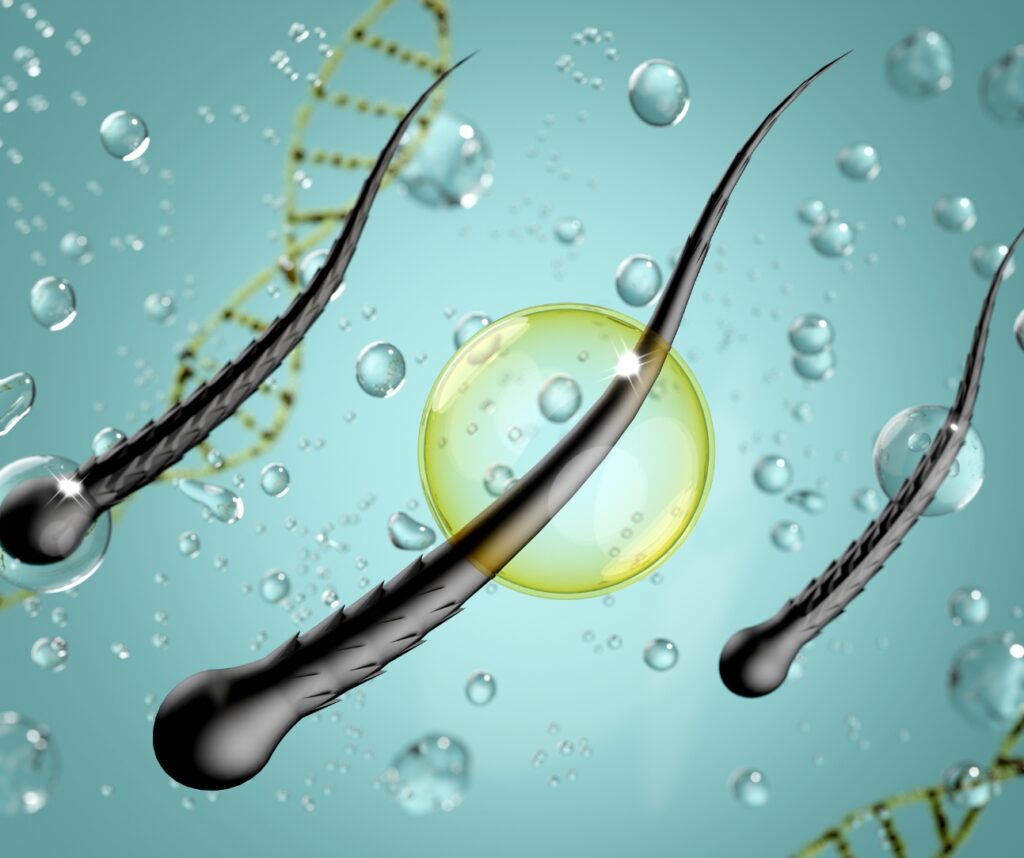
Certain vitamin deficiencies, such as vitamin D, iron, and biotin, can lead to hair loss. To tackle this blood test should be done. We outline the role of these vital nutrients in maintaining healthy hair and offer insights into dietary adjustments and tablets or capsule to combat deficiencies.
Several vital nutrients play a crucial role in maintaining healthy hair and combating hairfall. Iron is essential for transporting oxygen to hair follicles, while zinc aids in hair tissue growth and repair. Biotin supports the production of keratin, the protein that makes up hair strands. Including iron-rich foods like lean meats and leafy greens, zinc sources like nuts and seeds, and biotin-rich foods like eggs and avocados in your diet can help address deficiencies and promote healthy hair growth.
What is Nanoplastia hair treatment ? it is a salon hair treatment that penetrates the hhair (at cellular level) and strenghtjens and restore hairs.
Additionally, certain supplements can assist in combating nutrient deficiencies. Consultation with a healthcare professional or a registered dietitian can help determine the appropriate supplements for your specific needs. However, it’s important to note that supplements should complement a balanced diet rather than replace it. By making dietary adjustments and incorporating suitable supplements, you can nourish your body with the necessary nutrients to support healthy hair and minimize hairfall.
Handling Hair Loss: How to Stop Hair Fall Immediately
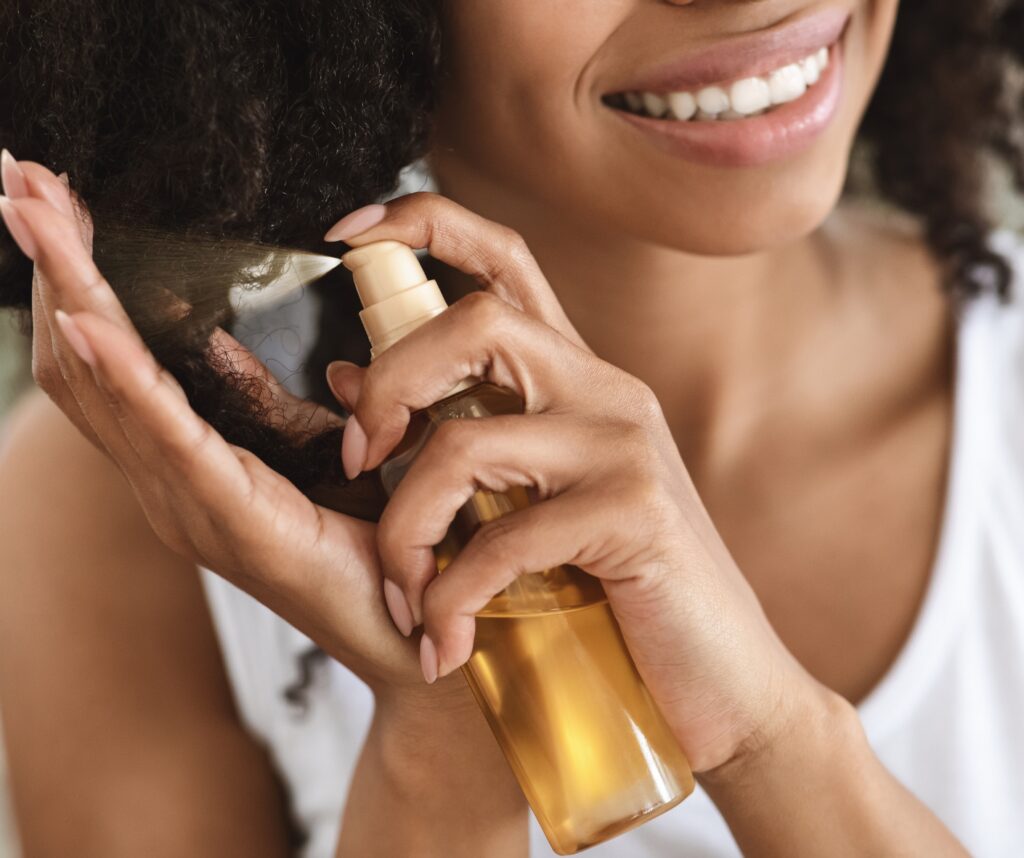
How to lose hair fall?
If you’re looking for immediate solutions to reduce hair fall, we share practical tips and hair care practices to incorporate into your daily routine. From gentle scalp massages to the right choice of hair products, discover effective ways to combat hair loss.
Incorporating practical tips and hair care practices into your daily routine can help combat hair loss and promote healthier hair. Start by incorporating gentle scalp massages into your routine to stimulate blood flow to the hair follicles. This can be done using your fingertips or a soft-bristle brush.
Choosing the right hair products is crucial. Opt for gentle, sulfate-free shampoos and conditioners that are suitable for your hair type. Avoid excessive heat styling and tight hairstyles that can cause hair breakage. Instead, embrace air-drying or use heat protectant sprays when using styling tools. Additionally, regularly trimming your hair can prevent split ends and promote healthier hair growth.
Remember to protect your hair from environmental damage by wearing hats or scarves when exposed to harsh weather conditions. Lastly, managing stress levels through relaxation techniques like yoga or meditation can also contribute to healthier hair. By incorporating these practical tips and hair care practices into your daily routine, It is possible to it is possible to grow new hairs after hair falls. You can take proactive steps towards combating hair loss and promoting optimal hair health.
Hair loss can be a distressing experience, but understanding its causes and implementing appropriate solutions can help restore healthy hair growth. By addressing factors such as hormonal imbalances, nutrient deficiencies, and adopting good hair care practices, you can combat excessive hair fall and promote a fuller, healthier mane. Remember, early intervention and seeking professional advice can make a significant difference in tackling hair loss effectively.


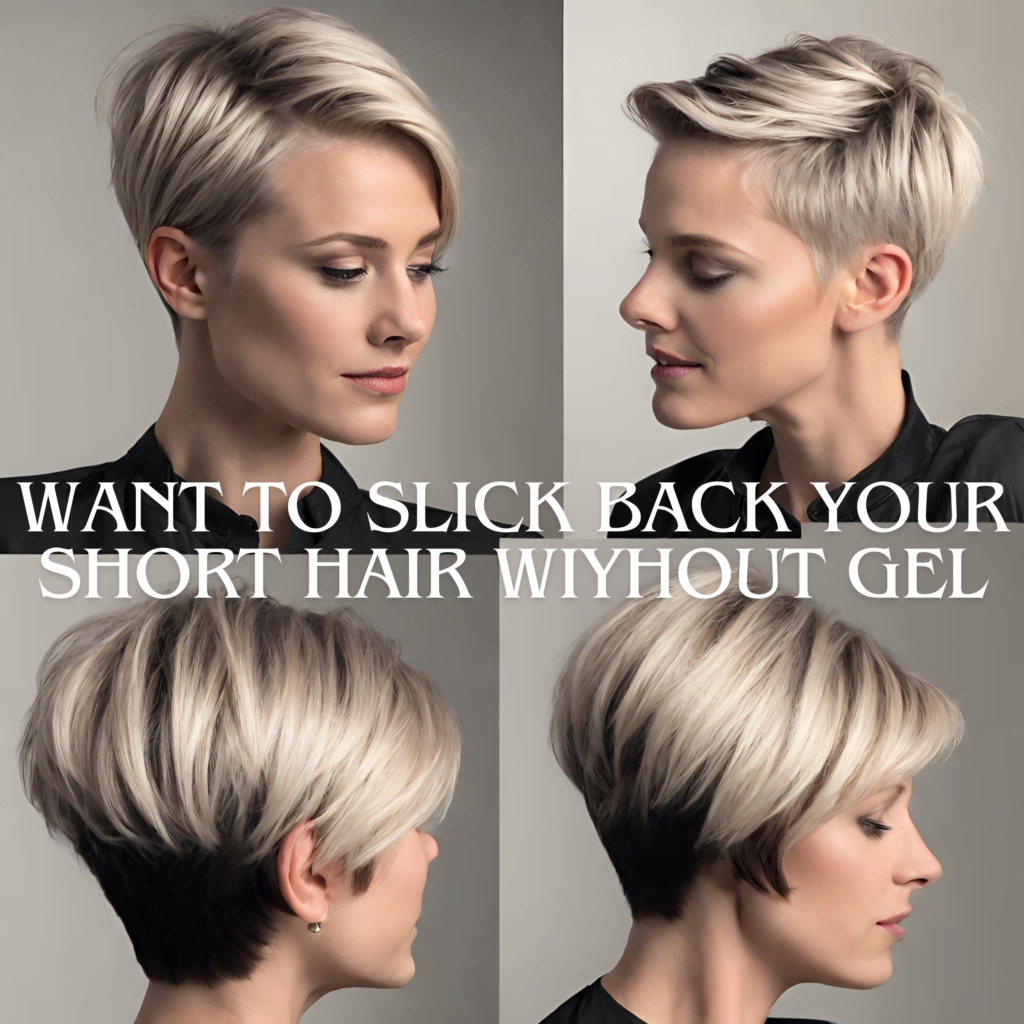
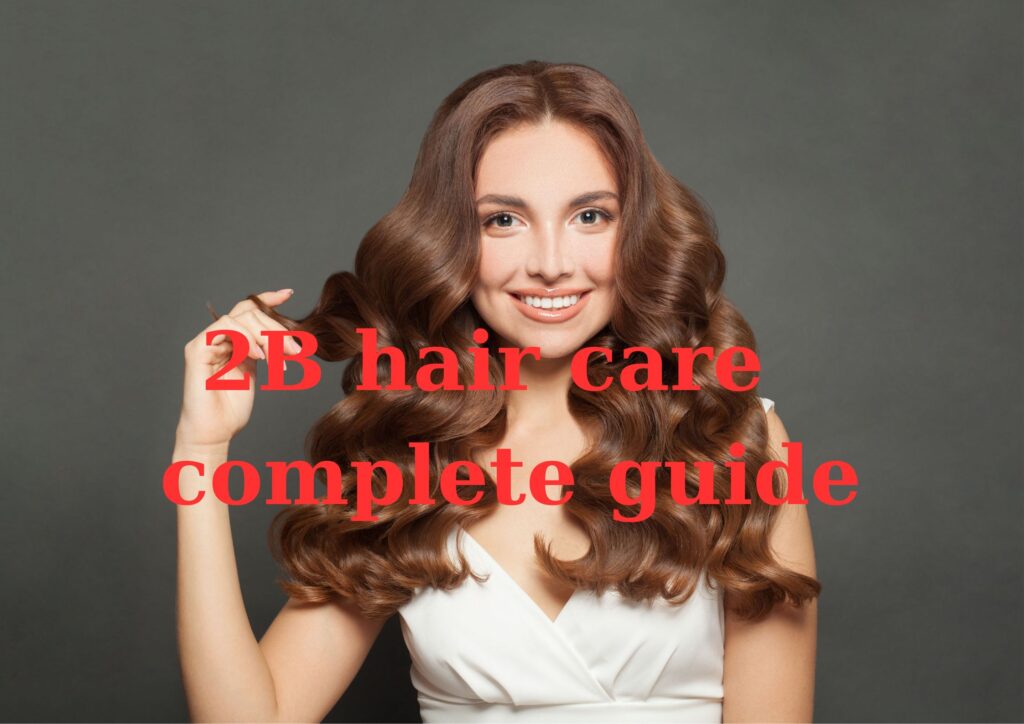

Excellent post. I was checking constantly this blog and I am impressed!
Extremely helpful information particularly the last part 🙂 I care for such information a lot.
I was seeking this particular info for a
long time. Thank you and good luck.